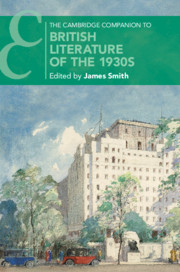Book contents
- The Cambridge Companion to British Literature of the 1930s
- The Cambridge Companion to British Literature of the 1930s
- Copyright page
- Contents
- Notes on Contributors
- Introduction
- Chapter 1 Poetry
- Chapter 2 The Literary Novel
- Chapter 3 Drama
- Chapter 4 Publishing and Periodicals
- Chapter 5 The Middlebrow and Popular
- Chapter 6 Modernism
- Chapter 7 Communism and the Working Class
- Chapter 8 Empire
- Chapter 9 Travel
- Chapter 10 The Regional and the Rural
- Chapter 11 The Queer 1930s
- Chapter 12 Remembering and Imagining War
- Chapter 13 Fascism and Anti-Fascism
- Chapter 14 Fashioning the 1930s
- Index
- Cambridge Companions to …
Chapter 12 - Remembering and Imagining War
Published online by Cambridge University Press: 18 December 2019
- The Cambridge Companion to British Literature of the 1930s
- The Cambridge Companion to British Literature of the 1930s
- Copyright page
- Contents
- Notes on Contributors
- Introduction
- Chapter 1 Poetry
- Chapter 2 The Literary Novel
- Chapter 3 Drama
- Chapter 4 Publishing and Periodicals
- Chapter 5 The Middlebrow and Popular
- Chapter 6 Modernism
- Chapter 7 Communism and the Working Class
- Chapter 8 Empire
- Chapter 9 Travel
- Chapter 10 The Regional and the Rural
- Chapter 11 The Queer 1930s
- Chapter 12 Remembering and Imagining War
- Chapter 13 Fascism and Anti-Fascism
- Chapter 14 Fashioning the 1930s
- Index
- Cambridge Companions to …
Summary
Although the First and Second World Wars were fought a generation apart, their historical, ethical, and political meanings continue to be debated. The terms concern whether both wars should be regarded as constituting a continuous battle for political and cultural supremacy or as distinct events, as either one battle bleeding into another with a brief interruption or as the Second World War erupting from unresolved, conflicting ideologies and interests carried over from the First. Squeezed between these perspectives is the decade of the 1930s in which memories of the 1914–18 war and anxieties about another conflagration were troubled further by the economic and social consequences of the Great Depression that devastated people’s lives on both sides of the divide. The 1930s in Britain was a war between, in which political, social, and cultural debates served as the only available weapons of defence against pervasive doubts about both the unstable present and the possibility of a stable future.
- Type
- Chapter
- Information
- The Cambridge Companion to British Literature of the 1930s , pp. 191 - 206Publisher: Cambridge University PressPrint publication year: 2019

